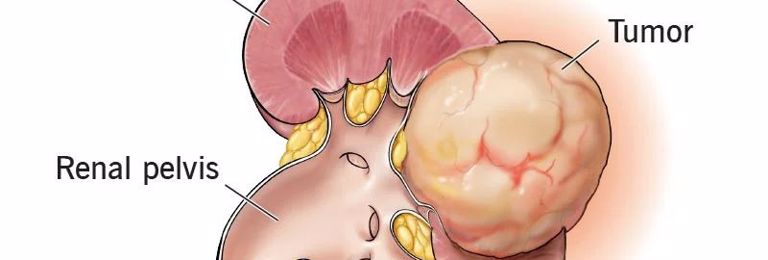Renal tumors are masses in the kidneys that can be benign or malignant. Most do not cause symptoms and are discovered incidentally by another medical condition.
Types of tumors
Types of benign kidney tumors include:
- Renal adenoma: Renal adenomas are the most common form of benign solid renal tumor and are usually small, low-grade growths. its cause is unknown
- Renal oncocytoma: Oncocytoma is a benign, usually asymptomatic tumor that can grow quite large. They can develop throughout the body and are not exclusive to the kidneys. Its cause is also unknown and they appear more frequently in men than in women.
- Angiomyolipoma: Also known as renal hamartoma, angiomyolipomas are rare benign tumors that can be caused by an inherited genetic mutation. They can occur in isolation and individually, but are most often associated with a rare genetic disease called tuberous sclerosis, which can cause cancer of the skin, kidney, brain, and other organ systems. In patients without tuberous sclerosis, these tumors occur more frequently in middle-aged women.
- Fibroid: Fibroids are tumors of fibrous tissue in, in, or around the kidney. They are rare and more common in women. Its cause is unknown and most have no symptoms.
- Lipoma: Lipomas are rare kidney tumors that originate from the fat cells within the kidney capsule or surrounding tissue. Lipomas usually occur in middle-aged women.
Malignant kidney tumors
The two main types of kidney cancer are renal cell cancer and transitional cell cancer. In adults, renal cell carcinoma, which begins in the lining of small tubes within the kidney, is the most common. Transitional cell cancer is much less common. Wilms tumor, another type of kidney cancer, is more common in children.
Symptoms
Kidney cancer symptoms can include:
- Blood in the urine
- Pain or a lump in the lower back
- Asthenia
- loss of appetite
- unexpected weight loss
- Fever
- Anemia
Diagnostic tests may include:
- Urine tests: Using a urine sample of normal urine, doctors will determine if the urine contains cancer cells.
- Cystoscopy: Allows your doctor to see inside your body with a thin, flexible, lighted tube called a cystoscope.
- Biopsy: Removal of a small amount of tissue for examination under a microscope.
- Computed tomography (CT) scan – creates a three-dimensional image of the inside of the body using X-rays
- Magnetic resonance imaging (MRI): uses magnetic fields, not X-rays, to produce detailed images of the body
- Positron emission tomography (PET) scan – creates images of organs and tissues within the body
- Ultrasound – uses sound waves to create an image of internal organs
- Blood tests: to check for increased blood levels of some proteins
Treatment
Surgery
Surgery is usually the first-line treatment for benign kidney tumors, or kidney cancer that has not spread. Laparoscopic surgery allows for a minimally invasive operation, in which the surgeon makes small incisions in the abdomen to insert a small light, camera, and other tools that are used to view and remove the tumor. Laparoscopic surgery has proven to be as effective as traditional surgery and to facilitate recovery.
- minimally invasive surgery
- laparoscopic radical nephrectomy
- robotic partial nephrectomy
- radiofrequency ablation
Active Surveillance of Smaller Renal Tumors
In selected patients, tumor growth can simply be monitored over time (called "active surveillance"). The decision to conduct active surveillance depends on a number of factors, including
- patient age
- General health of the patient
- Tumor size on imaging (CT, MRI, or ultrasound)
- Tumor growth rate over time
- immunotherapy
Immunotherapy, also called biologic therapy, is a type of cancer treatment designed to stimulate the body's natural defenses to fight cancer. It uses materials made by the body or in a laboratory to enhance, attack, or restore the function of the immune system. Immunotherapy works through these mechanisms:
- Stop or slow the growth of cancer cells
- Stop the spread of cancer to other parts of the body.
- Help the immune system work better to kill cancer cells
Monoclonal antibodies
Antibodies are proteins produced by the immune system to help fight infection. Man-made versions, called monoclonal antibodies (mAbs), can be designed to attack a specific target. When a monoclonal antibody binds to a cancer cell, it can allow the immune system to kill the cancer cell, stop the rapid growth of cancer cells, and deliver drugs directly to cancer cells.
Monoclonal antibodies currently approved by the US Food and Drug Administration (FDA) for the treatment of cancer include Alemtuzumab (Campath), Bevacizumab (Avastin), Cetuximab (erbitux), Ipilimumab (Yervoy), Nivolumab (Opdivo ), Ofatumumab (Arzerra), Panitumumab (Vectibix), Pembrolizumab (Keytruda), Rituximab (Rituxan), Trastuzumab (Herceptin)
Cytokine immunotherapy
Non-specific immunotherapies also help the immune system kill cancer cells. Cytokines are a category of small proteins important in cell signaling. They are released by cells and influence the behavior of other cells. They are especially important in the immune system; cytokines modulate the balance between humoral and cellular immune responses and regulate the maturation, growth, and reactivity of particular cell populations. They are important in health and disease, particularly in host responses to infection, the immune response, inflammation, trauma, sepsis, cancer, and reproduction.
Two common cytokine immunotherapies are:
- Interleukins help the immune system make cells that kill cancer. A laboratory-produced interleukin called interleukin-2, IL-2, or aldesleukin (proleukin), is used to treat kidney and skin cancer, including melanoma.
- Interferons help the immune system fight cancer and may slow the growth of cancer cells. A laboratory-produced interferon, called interferon-alpha (Roferon-A [2a], Intron A [2b], Alferon [2a]), is the most common type of interferon used in cancer treatment.


